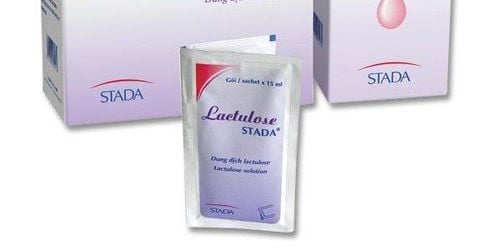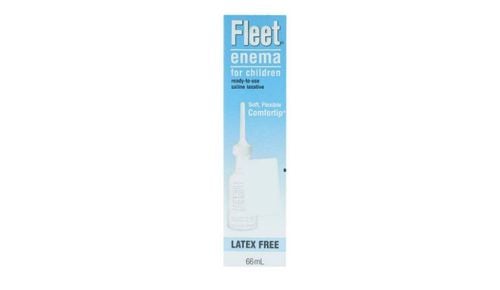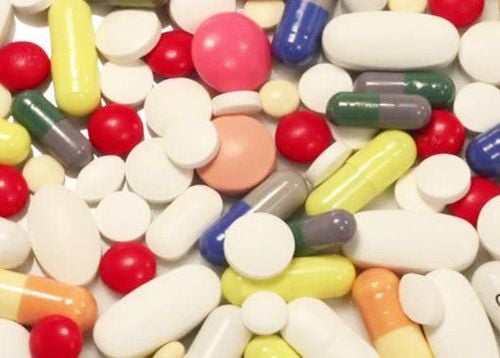This is an automatically translated article.
The article was professionally consulted by Specialist Doctor I Dang Thi Ngoc Chuong - Department of Pediatrics - Neonatology, Vinmec Central Park International General Hospital. The doctor has extensive experience in the diagnosis and examination of neonatal pathology - neonatal resuscitation.Water is an important component of the body, dehydration can be life-threatening. Especially in hot weather, or when the baby is sick, dehydration will be more. But because the baby's kidney function is not yet complete at birth, too much water can be dangerous for the baby.
1. Newborns get enough water through breast milk
Breast milk is more than 80% water, especially colostrum (the first milk of each feeding). Therefore, whenever a mother feels her child is thirsty, she can breastfeed. This will satisfy your baby's "thirst" and continue to protect him from the risk of infection. Babies don't need water before 6 months of age, even in hot climates. This is also one of the reasons that the World Health Organization (WHO) recommends that babies be exclusively breastfed for the first 6 months of life.A child is considered exclusively breastfed when receiving only breast milk, without any additional food or liquids, not even water; except when the child needs to take medicine, oral rehydration solution, drops, vitamin and mineral syrup as prescribed by the doctor.
When you breastfeed, you give your baby all the water he needs, while providing safe water and protecting him against diarrhea.
Giving a child large amounts of water can even lead to water intoxication, which is a condition in which electrolytes (such as sodium) in the baby's blood are diluted, inhibiting normal bodily functions. and lead to dangerous problems such as low body temperature or convulsions. Since babies under 6 months of age have low body mass, drinking water can easily exceed the body's normal need for sodium - minerals. and this electrolyte is already present in breast milk when the mother is breastfeeding.
Trắc nghiệm: các chỉ số cần chú ý về sự phát triển thể chất của trẻ
Chiều cao, cân nặng của bé ở từng giai đoạn nên là bao nhiêu là bình thường, bao nhiêu là bất thường? Cùng ThS.BS Ma Văn Thấm điểm lại xem bạn đã nắm được các chỉ số phát triển thể chất của bé chưa nhé!The following content is prepared under supervision of Thạc sĩ, Bác sĩ y khoa, Ma Văn Thấm , Nhi , Phòng khám Đa khoa Quốc tế Vinmec Dương Đông(Phú Quốc)
2. Should babies drink water?
Exclusively breastfed infants under 6 months of age do not need additional water. However, if your baby is being given formula, you should give him a little extra water from time to time. Since formula milk usually contains more salt, giving your baby a little extra water will help facilitate excretion. In addition, because the metabolism of formula-fed babies will be slower, they will often have more water needs than breastfed babies.If your baby is constipated, has a fever or if the weather is too hot, you can give him a few teaspoons of cooled boiled water. However, avoid giving your baby too much and always consult your doctor before doing this.

3. Harms when giving water to children
3.1. Drinking water can affect milk absorption
For babies under 6 months, breast milk is a complete food source containing all the nutrients a baby needs, including water. Therefore, giving your baby extra water will interfere with the ability to absorb nutrients in breast milk. Not only that, the size of a newborn's stomach is still very small, drinking more water will fill the stomach, make the baby full and refuse to breastfeed. Over time, the baby will not receive enough nutrition from breast milk, thereby affecting the growth and development of the baby.3.2. Increased risk of infection
Drinking water can be harmful for babies because drinking water can make them more susceptible to infections. Water, no matter how clean and pure, carries the risk of containing pathogens.The baby's immune system is still weak, if he drinks water containing pathogens, he will be at high risk of diarrhea and malnutrition. Statistically, babies who drink extra water are two to three times more likely to develop diarrhea than babies who are exclusively breastfed.
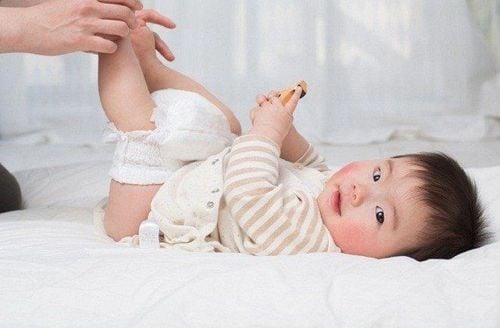
3.3. Water poisoning
This condition is relatively rare, but children have had it. Giving your baby plenty of water to drink will dilute the sodium levels in the body. That amount of sodium will follow the water to escape from the body because the baby's kidneys are not yet complete, thereby leading to a deficiency. Children with sodium deficiency can affect brain activity, they may have epilepsy, convulsions...3.4. Impact on mother's health
Giving water to babies under 6 months old is not only bad for the baby's health but also causes many problems for the mother's health. Some experts suggest that this action can impact breast milk production.4. When to give water to children?
Health organizations around the world advise mothers to wait until the baby starts to eat solids. At that point, the mother can provide a small amount of cooled boiled water but does not replace breast milk. Babies should still be breastfed to continue and continue until after that, according to WHO recommendations, it should be extended to 24 months for the child to be fully developed.
4.1. When should the baby drink water?
The best time you can start giving your baby water is when he or she starts solids. Drinking water at this time will help prevent constipation. When your baby has passed the weaning stage, you should also continue to breastfeed your baby because breast milk is a great source of nutrition and good for health.4.2. How to get your baby to drink water
You can give your baby water with a spoon or pour water into a bottle or cup to make it easier for him to drink. Young children often imitate what adults do, so every time you drink, set an example for your child.4.3. How much water should the baby drink?
At this time, the baby will not need to drink too much water. When your baby is 4-6 months old, you can give him a few sips of water every day (no more than 4 tablespoons). As your baby gets a little older, you can gradually increase this amount.Usually, training young children to drink water is quite simple. When your baby is a little older, practice giving your baby the habit of drinking water every time you go out, after playing or eating... Drinking water regularly is a good habit to help your baby stay away from health problems. Future. If you find that your baby doesn't like to drink water, don't try to force him, but try giving him water again next time.
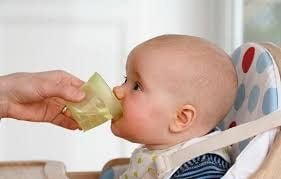
5. Note when giving water to children
When giving water to your baby, you need to note a few things:Feed your baby on demand. Do not let your baby drink water before meals because it makes the baby feel full, doesn't want to eat, and dilutes the gastric juice. Not good for the stomach and digestive system. Limit drinking a lot of water before going to bed because it can make your baby easy to "wet" or wake up in the middle of the night, affecting sleep. Vinmec International General Hospital is one of the hospitals that ensures professional quality with a team of leading medical doctors, a system of modern technological equipment, and comprehensive medical examination, consultation and treatment services. , civilized medical examination and treatment space, polite, safe and maximum sterilization. Customers when choosing to perform tests here can be completely assured of the accuracy of test results.
Please dial HOTLINE for more information or register for an appointment HERE. Download MyVinmec app to make appointments faster and to manage your bookings easily.






